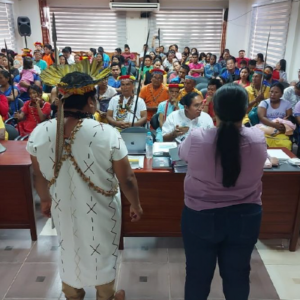Eleven years ago, the transnational oil company Chevron, formerly Texaco, received a historic sentence in Ecuador. It was forced by the justice of that country to pay a compensation of 9.5 billion dollars for the damages caused to indigenous communities and settlers in the provinces of Orellana and Sucumbíos in the Amazon region. This lawsuit was filed by the Union of People Affected by Texaco (now Chevron), known as UDAPT [1] by its acronym in Spanish. This is a grassroots organization of Friends of the Earth International in Ecuador. Even though this sentence was ratified in 2018 [2] when the Constitutional Court of Ecuador denied the protection action requested by Chevron, to date the 30,000 people affected have not been able to access their reparation.
The level of impunity borders on the absurd; the bank account of the oil company in Ecuador did not reach 400 dollars, so at the national level there were not enough funds to fulfill the sentence. On the other hand, Chevron sued the Ecuadorian State in international bodies, specifically in the Court of Arbitration in The Hague (Netherlands), based on the Ecuador-United States Investment Protection Treaty, arguing that the State should not have allowed the UDAPT lawsuit that led to the 2011 sentence. The Hague ruled in favor of Chevron in first and second instance, and it is currently in final instances after the State appealed [3]. While the final ruling has not yet been determined, the Ecuadorian government has already allocated 2 billion dollars of its budget to pay the amount.
As Chevron does not have assets in Ecuador, the UDAPT worked tirelessly to enforce the reparation sentence in other parts of the world where the oil company does have assets, but the Ecuadorian State has taken care, with different strategies, to make it impossible. Given this situation, on Thursday, March 23, UDAPT announced at a press conference [4] a lawsuit filed before the Inter-American Commission on Human Rights against the government of Ecuador, in order to assess if the case could be raised to the Inter-American Court of Human Rights. The petition also contains a request for precautionary measures to stop the State from intervening and curtailing the possibility of reparation at the international level.
Real World Radio interviewed Julio Prieto, legal advisor of the UDAPT, to learn more about the lawsuit filed against Ecuador in the IACHR.
“The government is interfering in a case between private parties in favor of the Chevron company”
according to Prieto, the Attorney General of the State “sent offices asking for a non-recognition of the sentence of the Ecuadorian inhabitants” to the supreme courts of other countries, as in the case of Canada and Argentina. For the lawyer, this constitutes a violation of human rights, since states must guarantee effective judicial remedies, and he stressed,
“it is not understood how a state interferes in the court of other states with the aim of having its own sentences unrecognized.”
That is why they are also asking the IACHR for a precautionary measure in order to be able to move forward in executing the sentence in other countries, without the state interfering again.
In both Argentina and Canada, the UDAPT had achieved recognition of the national judgment and the seizure of Chevron’s assets in order to collect the reparation, but both processes ultimately fell through the intervention of then attorney general Iñigo Salvador.
As for Chevron’s judicial award against the Ecuadorian State in The Hague, Prieto explained, “they are ordering the Ecuadorian State to violate its own laws and go against its public order. The sentence has been enforced since 2012 and there is no way, nor procedure in which it can be annulled or reversed.”
“Apparently, there is a kind of partnership between Chevron and the government of Ecuador; this reaches the point where the current Minister of Energy Fernando Santos, that was a lawyer for Chevron, has already publicly spoken out against those affected, saying they are phonies”
Julio Prieto explained. The only possible explanation for the events that occurred and sustained over time is that “the Ecuadorian state is totally captured by the American embassy, which is a very good defender of the corporate interests of its companies,” said the lawyer.
